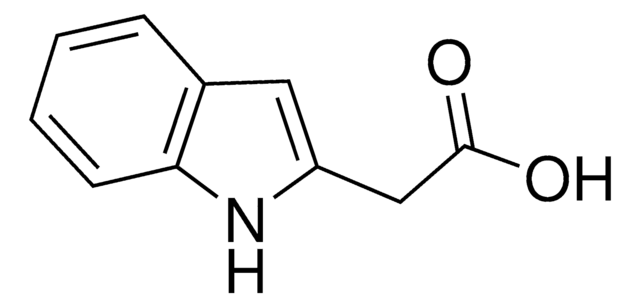45533
3-Indoleacetic acid
PESTANAL®, analytical standard
Synonym(s):
Heteroauxin, IAA
Sign Into View Organizational & Contract Pricing
All Photos(1)
About This Item
Empirical Formula (Hill Notation):
C10H9NO2
CAS Number:
Molecular Weight:
175.18
Beilstein:
143358
EC Number:
MDL number:
UNSPSC Code:
41116107
PubChem Substance ID:
NACRES:
NA.24
Recommended Products
grade
analytical standard
Quality Level
product line
PESTANAL®
Assay
98%
shelf life
limited shelf life, expiry date on the label
technique(s)
HPLC: suitable
gas chromatography (GC): suitable
mp
165-169 °C (lit.)
application(s)
agriculture
environmental
format
neat
SMILES string
OC(=O)Cc1c[nH]c2ccccc12
InChI
1S/C10H9NO2/c12-10(13)5-7-6-11-9-4-2-1-3-8(7)9/h1-4,6,11H,5H2,(H,12,13)
InChI key
SEOVTRFCIGRIMH-UHFFFAOYSA-N
Looking for similar products? Visit Product Comparison Guide
Related Categories
General description
3-Indoleacetic acid is a highly effective, growth promotor in lower plant life, formed by a variety of fungi, including yeast and has been isolated from Aspergillus niger and Rhizopus sp. It is commonly employed in horticulture and industry.
Application
3-Indoleacetic acid may be used as an analytical reference standard for the quantification of the analyte in environmental samples using gas chromatography coupled to mass spectrometry.
Refer to the product′s Certificate of Analysis for more information on a suitable instrument technique. Contact Technical Service for further support.
Legal Information
PESTANAL is a registered trademark of Merck KGaA, Darmstadt, Germany
Storage Class Code
11 - Combustible Solids
WGK
WGK 3
Flash Point(F)
Not applicable
Flash Point(C)
Not applicable
Personal Protective Equipment
dust mask type N95 (US), Eyeshields, Gloves
Choose from one of the most recent versions:
Already Own This Product?
Find documentation for the products that you have recently purchased in the Document Library.
Customers Also Viewed
Multiresidue analysis of pollutants as their trimethylsilyl derivatives, by gas chromatography-mass spectrometry
Sebok A, et al.
Journal of Chromatography A, 1216(12), 2288-2301 (2009)
Humic Matter in Soil and the Environment: Principles and Controversies (2003)
Amir H Ahkami et al.
Planta, 238(3), 499-517 (2013-06-15)
To determine the contribution of polar auxin transport (PAT) to auxin accumulation and to adventitious root (AR) formation in the stem base of Petunia hybrida shoot tip cuttings, the level of indole-3-acetic acid (IAA) was monitored in non-treated cuttings and
Ana Zúñiga et al.
Molecular plant-microbe interactions : MPMI, 26(5), 546-553 (2013-01-11)
Although not fully understood, molecular communication in the rhizosphere plays an important role regulating traits involved in plant-bacteria association. Burkholderia phytofirmans PsJN is a well-known plant-growth-promoting bacterium, which establishes rhizospheric and endophytic colonization in different plants. A competent colonization is
Xinhua Dai et al.
The Journal of biological chemistry, 288(3), 1448-1457 (2012-11-29)
Auxin regulates every aspect of plant growth and development. Previous genetic studies demonstrated that YUCCA (YUC) flavin-containing monooxygenases (FMOs) catalyze a rate-limiting step in auxin biosynthesis and that YUCs are essential for many developmental processes. We proposed that YUCs convert
Our team of scientists has experience in all areas of research including Life Science, Material Science, Chemical Synthesis, Chromatography, Analytical and many others.
Contact Technical Service







